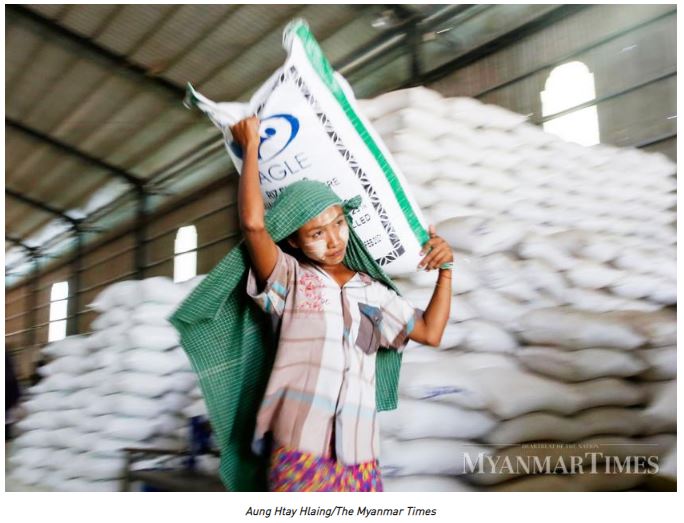Myanmar: Reinstatement of rice tariffs unrelated to politics: Brussels
The European Union will decide whether to restore tariffs on Indica rice imports from Myanmar in a bid to protect its own producers early next year. Brussels has denied the move is related to the country’s alleged human rights violations in northern Rakhine.
“The rapid increase of Myanmar’s Indica rice exports has overwhelmed some European producers. The EU will therefore probably reinstate customs duties to protect them,” a spokesperson of the EU Delegation to Myanmar told The Myanmar Times.
Myanmar currently benefits from the EU’s Everything But Arms (EBA) arrangement, part of the bloc’s Generalised Scheme of Preferences (GSP). The EBA trade regime gives least developed countries (LDCs) customs- and quota-free access to the world’s largest market for all products except arms.
EU Trade Commissioner Cecilia Malmström last month announced that the bloc is considering ending Myanmar’s trade privileges due to rights violations in northern Rakhine. European trade organisations and Myanmar business groups, including the Union of Myanmar Federation of Chambers of Commerce and Industry (UMFCCI) and Myanmar Rice Federation (MRF), came out against the proposed move.
But the possible reinstatement of customs duties on Myanmar rice exports is unrelated.
“This is specific to Indica rice and for purely economic reasons – there are no links whatsoever to the current wider political dialogue between the EU and Myanmar on potential EBA withdrawal over human rights concerns,” the spokesperson explained. Instead, duties are to protect EU industries which are harmed by “excessive imports at low prices”. In order to protect the industries, Brussels will reduce or even withdraw the specific trade privileges.
In this specific case, Italy claims that imports of Indica rice from Cambodia and Myanmar have increased substantially and that their respective EU market shares, of Indica rice, grew from 13pc to 21pc and from 0pc to 5pc in the last five rice marketing years. The corresponding import prices were substantially lower than prices of European producers, which would have presented serious difficulties to growers and millers of Indica rice in the bloc.
Brussels is currently undertaking an investigation for data collection and assessing the situation, before coming to a decision early next year whether increased imports from Myanmar under trade preferences are putting EU producers under pressure and causing financial difficulties which would not have existed in the absence of those preferences.
Nay Pyi Taw has until November 19 to respond to the case, according to U Aung Htoo, deputy commerce minister. U Ye Min Aung from Myanmar Rice Federation warned Myanmar’s rice industry will find it hard to compete with other rice exporters if the duties are imposed.
If the investigation establishes that EU producers are injured, it could result in the reintroduction of tariffs for Indica rice from Myanmar up to €170/per tonne (the MFN rate for rice is €170/per tonne). The investigation is expected to conclude by the beginning of 2019.
The spokesperson said the outcome of the investigation cannot be anticipated at this stage.
In 2013, the EU reinstated GSP for Myanmar as a means to provide political, economic and social support to help the country move towards democracy. The bloc is currently the sixth biggest trading partner for Myanmar. Total trade between the two partners equalled €2.09 billion in 2017. The EU, Myanmar’s sixth biggest trade partner, imported goods worth €1,549 million from Myanmar and exported goods worth almost €539 million to frontier market. EU imports from Myanmar are dominated by agricultural products and garments.
Source: https://www.mmtimes.com/news/reinstatement-rice-tariffs-unrelated-politics-brussels.html


 Thailand
Thailand




